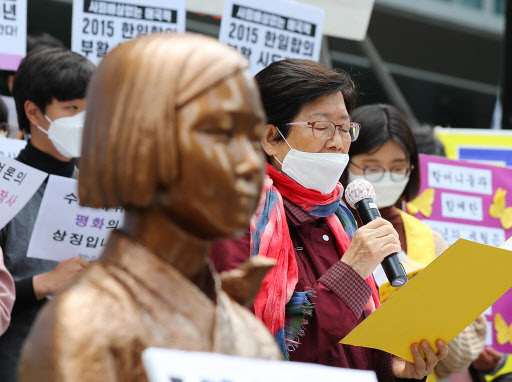Nongovernmental organizations at the forefront of advocating for Korean victims of wartime sexual enslavement by the Japanese military are facing snowballing allegations, threatening the legacy of the 30-year campaign for former sex slaves.
Prosecutors on Wednesday raided the office of the Korean Council for Justice and Remembrance for the Issues of Military Sexual Slavery by Japan in western Seoul, as part of the investigation into allegations over misuse of donations and poor accounting practices.
Organized by the Korean Council, the weekly rally seeking justice for the victims and demanding an apology from Japan was held as usual on Wednesday near the Japanese Embassy in Seoul.
Lee Na-young, the Korean Council’s incumbent president, said that she felt a heavy responsibility and apologized for causing pain to the victims and their supporters around the world.
“We already asked for an external accounting audit and are waiting to take the next procedures,” she said at the rally, referring to the accusations the civic group had not used the donations transparently. It earlier admitted to some “minor errors” in its accounting records.
The civic group is also accused of purchasing a shelter for the former sex slaves in Anseong, south of Seoul, at a rate far above market value in 2013 and selling it below the market price this year, which some say constituted dereliction of duty. Yoon was the president of the Korean Council when the purchase was made and Yoon’s father was hired to manage the shelter. There are also suspicions that the community home was used not for the victims, but for private purposes or profit.
The Korean Council apologized for its “wrong” judgment about the purchase of the shelter, but denied any irregularities or misuse of donations.
The Korean Council, which has led weekly rallies demanding an apology and reparations from Japan, was mired in controversy after Lee Yong-soo, a 92-year-old victim of Japanese military sexual slavery during Japan’s 1910-45 colonization of the Korean Peninsula, said the donations had not been spent on the victims and she had been used by the civic group.
Lee also said she would no longer participate in the weekly rallies that had been held every Wednesday since 1992.
Amid the growing rift, Yoon Mi-hyang, the Korean Council’s former president and a lawmaker-elect from the ruling Democratic Party, met with Lee for about 10 minutes to apologize to her on Tuesday, according to local media reports quoting those close to Lee. Lee is to hold a press conference Monday, according to the reports.
Yoon, who left the Korean Council in March to run as a proportional representative in the April general election, faces a slew of other allegations over real estate purchases and the use of her personal bank accounts to collect donations for such events as overseas visits by victims and funeral services for victims.
While denying most of the allegations, she made it clear she would not step down from her parliamentary seat.
The ruling Democratic Party reserved its position on the allegations surrounding Yoon, saying verifying them should come first.
Fresh allegations about misuse of donations were raised against the House of Sharing, one of the representative organizations leading the “comfort women” movement, triggering concerns that the 30-year-long movement against war violence could be tainted.
Seven staff members at the House of Sharing, which runs a nursing home where five of the survivors currently live, accused the organization of advertising itself as a shelter for the victims but not providing proper care and medical treatment. The elderly survivors had to pay for hospital fees and other necessities themselves, the staff members said in a press release.
The whistleblowers also claimed that the House of Sharing’s board of directors had floated the idea of making profits with the donations it raised by building and running a luxurious nursing home. The House of Sharing retains assets worth about 13 billion won ($10.57 million) in real estate and cash, they said.
The board of directors for the House of Sharing, which was founded in 1992 with funds from Buddhist organizations and is run under the Jogye Order of Korean Buddhism, apologized for the “poor” running of the organization. But they denied the accusations in a statement.
(
laeticia.ock@heraldcorp.com)








![[Today’s K-pop] Blackpink’s Jennie, Lisa invited to Coachella as solo acts](http://res.heraldm.com/phpwas/restmb_idxmake.php?idx=644&simg=/content/image/2024/11/21/20241121050099_0.jpg)